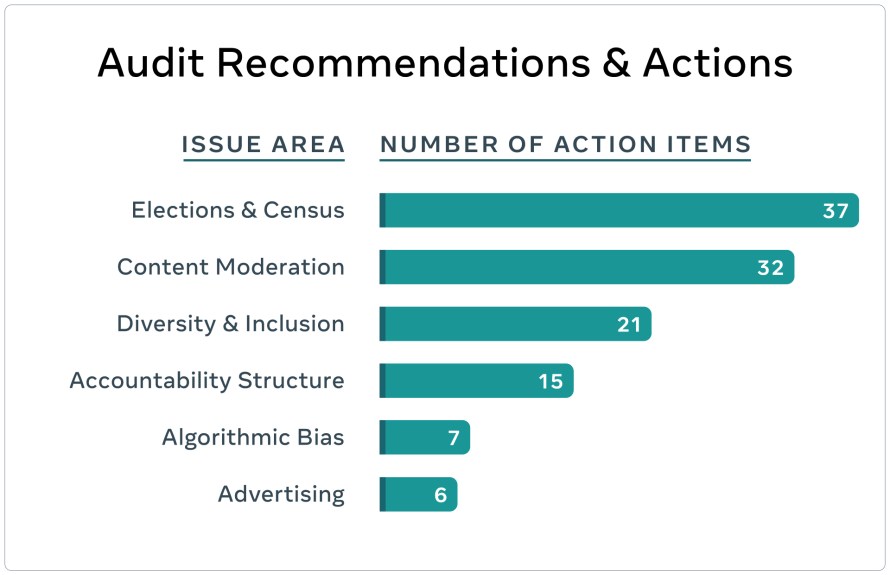- We’re releasing a progress report on the recommendations from our Civil Rights Audit as a part of our commitment to move toward increased equity, safety and dignity on our platforms.
- This report marks the beginning of the Civil Rights Team’s path to enhance protections for marginalized communities.
Today, just more than one year after the Civil Rights Team was established, we’re releasing Meta’s Progress on Civil Rights Audit Commitments. This report marks the beginning of the Civil Rights Team’s path to enhance protections for marginalized communities and demonstrates our commitment to move toward increased equity, safety and dignity on our platforms. Meta is committed to that evolution and its long-term progress.
I joined Meta, formerly known as Facebook, in January 2021 as the head of the Civil Rights Team, and as of just a few weeks ago, my team has grown to nine full-time employees. This team was created as a result of the audit that the company voluntarily undertook. The Auditors conducted their review over the course of two years and published a final report in July 2020.
The audit covered seven substantive issue areas under the leadership of Laura Murphy, a veteran civil rights and civil liberties leader, and was supported by Megan Cacace, a civil rights attorney and partner at Relman Colfax PLLC at the time of the audit.
The auditors described 117 actions and recommendations. 65 have been implemented, and 42 are either in progress or are ongoing, given the nature of the recommendation. We will continue to evaluate the feasibility of eight, and there are two recommendations that will not be implemented.

Some key highlights from the report include:
- Infrastructure
- The Civil Rights Team has grown to nine full-time employees, including six women of color. Their expertise spans voting rights, immigration, law enforcement and criminal justice, technology products and policy, hate crimes, counterterrorism and national security. We have folded into existing processes and developed new ones. Our team is also rolling out multiple internal trainings to provide education on civil rights laws in the United States.
- This infrastructure is further enhanced by our Human Rights Team and our new corporate human rights policy, embedded in the company code of conduct.
- US 2020 Elections
- Meta applied lessons learned from more than 200 elections around the world. We created new products and policies around voter suppression, created teams and technologies to combat election interference and made political advertising more transparent.
- Meta also helped more Americans register to vote — an estimated 4.5 million across Facebook, Instagram and Messenger — and made it easier for voters to get the information they needed. Learn more in our US 2020 election report.
- Content Moderation and Enforcement
- The company expanded its policies that prohibit veiled and implicit threats; added a policy to address hate speech attacks on concepts, ideas, practices, beliefs and institutions related to protected characteristics when those attacks pose an imminent risk of harm, intimidation or discrimination; enhanced its policies to provide increased protections for involuntary public figures; and adopted a policy to help protect people from brigading and mass harassment.
- Meta has also revisited its violence and incitement policies — specifically, the allowance around the discussion of state use of force. We’ve developed a framework to evaluate content posted by a state official, weighing the risk of contributing to offline harm against the importance of public awareness.
- Diversity, Equity and Inclusion
- The company has improved the representation of women and underrepresented minorities in our workforce and in leadership positions director-level and above, including Black and Latinx leaders.
- Meta has also diversified suppliers and vendors, and has distributed nearly all of the $100 million pledged last year in grants and ad credits to Black-owned small- and medium-sized businesses, creators and nonprofits.
- Ads
- Meta recently announced the decision to remove certain ad targeting options for advertisers. Starting next year, companies, organizations and other entities purchasing ads will not be able to select ad targeting options, such as interests related to health, race or ethnicity, political affiliation, religion or sexual orientation.
- Meta has also worked to provide more transparency and secure access data for researchers while protecting people’s privacy, including through the US-based pilot to provide researchers with access to more than 1.65 million social issue, electoral and political ads that ran during the three-month period prior to Election Day.
- Building Products with Civil Rights in Mind
- The Civil Rights Team embarked on developing a civil rights review process across Meta technologies called Project Height. This process will provide an analysis framework for product teams to assess potential civil rights concerns presented in new product launches.
- The Civil Rights Team partners with the Responsible AI team, and other people on the development and use of AI at Meta, to bolster the five key pillars Responsible AI has outlined in Meta’s efforts to build AI responsibly.
- Machine learning models are a significant tool in Meta’s content moderation work and we are always working to improve the development and use of models across our technologies.
- Meta cannot resolve potential differences in user’s experiences across groups if we don’t understand the demographics of our community. The company, led by our Civil Rights and Responsible AI teams, is working to better understand whether the experiences of our users differ across race, while preserving their privacy. Our long-term goal is to better understand people’s experiences across all protected characteristics and groups. You can read more about this here.
To become a better company, we have to meaningfully engage in how we can strengthen and advance civil rights at every level, and we remain committed to doing this industry-leading work.
Read the full report for more information.



